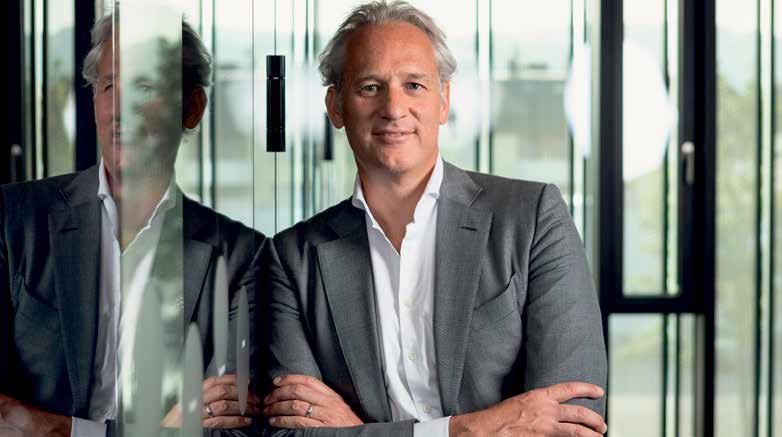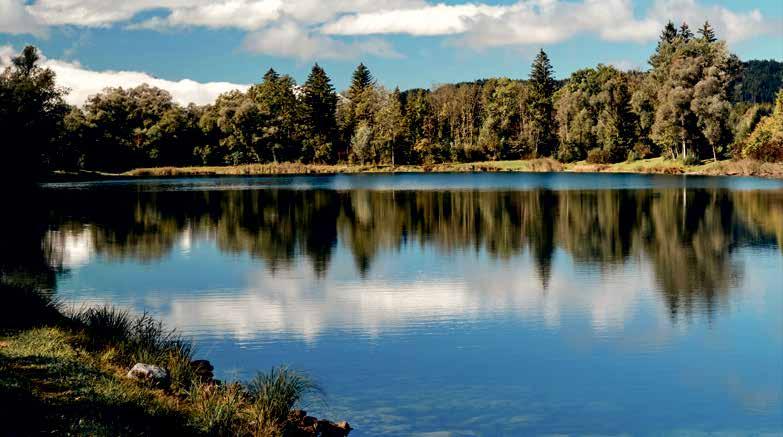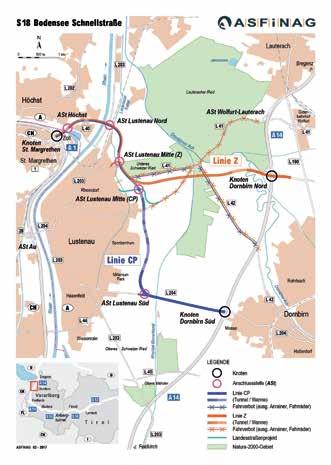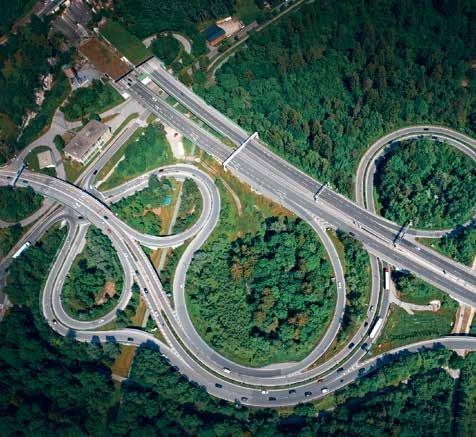
10 minute read
Vorarlberg – business indicators bring optimism
by medianet
Martin Ohneberg, President of the Vorarlberg Federation of Industries, and Hans Peter Metzler, head of the Vorarlberg Economic Chamber, speak about the challenges in their province and how to tackle them.
After a few years of solid growth in the gross added value, Vorarlberg’s economy suffered a heavy setback in 2020 due to the Covid pandemic. Real gross added value (without agriculture and the timber industry) fell by 6.4 percent, which was in tune with the Austrian average. In retail, turnovers fell by 3.8 percent and thus not as bad as in the rest of Austria (-4.6 percent). The production index of sold products was slightly worse than the year before (-3.2 percent) but still better than the Austrian average of -5.5 percent. Vorarlberg’s building sector, however, recorded a strong growth of 3.2 percent (the Austrian average was at -1.8 percent). “The short work scheme and Covid reliefs prevented employment numbers from falling even more,” says Regional Councillor Marco Tittler.
Advertisement
The pandemic had a high impact on all economic areas and tourism was hit the hardest of all sectors in 2020. Vorarlberg’s export industry also recorded noticeable slumps in turnover in the first half of 2020. Preliminary figures for the months January to June 2020 show goods worth 4.87 billion euros exported and goods imported to the amount of 3.7 billion euros. Compared to the same period the year before, exports fell by 8.4 percent and imports by 8.5 percent. The trade balance stayed in the black with 1.17 billion euros. All over Austria, exports went down by 12.6 percent and imports by 11.7 percent. This year, the trend is pointing upwards again, according to the figures from Vorarlberg’s economic report.
Martin Ohneberg, President of the Vorarlberg Federation of Industries, and Hans Peter Metzler, head of the Vorarlberg Economic Chamber, offer further insights into the province’s economy and industry.
Mr Metzler, Mr Ohneberg, how are Vorarlberg’s businesses doing at the moment? Hans Peter Metzler: The pandemic has hit us all; the challenges of a global pandemic are manifold and know no borders between sectors. One-person-businesses and international top players alike were faced with novel, never-seen-before facts from one day to the other. Hardly anything was more important than planning reliability, tax reliefs, financial aids and promotion programmes, investments, innovation, digitisation, supply with raw

Martin Ohneberg: “Vorarlberg currently sits in last place in Austria when it comes to competitiveness in the field of innovations.”
materials, good solutions for staff. This crisis gives us the opportunity to better understand the inner workings of growth. The economic trend is pointing upwards, in any case, as the latest economic report on Vorarlberg shows. Martin Ohneberg: After the initial huge insecurity at the start of 2020 and the unforeseeable effects of the pandemic on the economy, there are now – one year later – clear signs of an upswing: The order books are well-filled, the outlook among businesses is good. The high prices for raw materials and their scarcity, combined with a lack of skilled workers, dampen the mood. These factors have led to companies being unable to ramp up their production as much as they wanted to. I can tell you that the industrial sector in Vorarlberg is in an optimistic mood but the effects of the pandemic will stay with us throughout the next year.
The number of vaccinations kept rising before the summer while the number of infections fell. We seem to have overcome the worst. But have we really? Is the crisis over? What do we need to look out for now? Metzler: A lot of the optimism is surely carried by the increasing vaccination rate. We were also able to avoid another lockdown in Vorarlberg (N.B. while the rest of Austria was locked down), which was psychologically and economically very important. We were the role model in Covid test concepts and their digital organisation. But the way out of the economic crisis was full of setbacks and losses, and now we must not endanger the hardearned and patiently awaited status quo with careless actions, underestimating Covid. Neither our economy nor our society will be able to take another full lockdown and state of shock.
While we are taking care of the current, specific challenges of the pandemic we must not forget our fundamental challenges and goals: Jobs, investments, research, education, sustainability and climate protection, infrastructure and so on. Even though collaborating with politicians is working out quite well, we need to stay on the ball with these topics and ensure the creation of the right conditions – that’s how a partnership works. Ohneberg: The pandemic has shown that there are clear weaknesses, ranging from playing catch-up in terms of digitisation and insufficient cross-regional cooperation to finding the right balance between work and taking care of your family. We have to learn from this and prepare ourselves as the pandemic isn’t over yet. We need to improve the willingness of people to get vaccinated so we can return to normality. After all, we have to

Vorarlberg can offer market-ready, climate- and environment-friendly processes, products, services and consumption patterns – and a beautiful countryside.
learn how to live with this disease. If there is one thing I could wish for, it is for the media to report less about Covid to reduce the hysterics surrounding it.
We should always think positive – so what are the positive findings you are taking with you from the Covid crisis? Metzler: The staying power, the flexibility and the resolution of businesses, but also politicians, entrepreneurs and the public tackling the problems together is something that has impressed me and given me a lot of optimism every day. This has surely helped in dealing with the daily bad news and also helped find common ground to get out of the crisis.
A lot of businesses have also shown a large degree of flexibility and sometimes seized the opportunities of the pandemic. It is my wish and my aim to clearly define with everyone what “our” contribution is – what we as an Economic Chamber can do for everyone, for businesses and for our country, now and in future. And businesses take up a central role; they have learnt a lot during the pandemic: To be more flexible with changes and to adapt better to new situations. These experiences will make them come out of the pandemic stronger, and that is cause for optimism in many regards.
Look at the figures for business establishments 2020. Overall, we saw 1.200 new companies founded in Vorarlberg – that is on average three per day. This is not only 11.3 percent more than the year before, it comes also in spite of Covid. The latest figures for the first half of 2021 already show 756 new businesses established in Vorarlberg, which is an increase of 33 percent. This entrepreneurial spirit makes everyone optimistic.
Requirements and expectations of products and services are becoming more and more complex, and Vorarlberg’s businesses are holding their own quite well in the face of stiffer global competitiveness thanks to their innovative capacity. The pandemic actually turned out to be a real booster for innovation: The number of patent applications from Vorarlberg speaks its own language and our Innovation Prize puts the creativity and efforts of our businesses in the limelight.
When it comes to exports, Vorarlberg once more recorded a volume above ten billion euros in 2020; Vorarlberg’s export economy fell by 2.6 percent, which can be considered a success due to the problems with the pandemic. Ohneberg: There was a strong shift in values in our society, which went deep down the population. Secure and great jobs


The Federation of Industries wants to speed up infrastructure projects such as the Bodensee expressway. Pictured is the motorway junction Bregenz along the A14.
have gained in significance. The same goes for a good education, no matter whether it is an apprenticeship, in school or university. Regional products and the seal of quality “Made in Vorarlberg” have also gained highly in importance. For the industrial sector regionalisation and globalisation are not mutually exclusive. The industry is committed to Vorarlberg and the added value in its surrounding environment, but it needs global markets. We also learned that we have to pay more attention to balancing family life and work life. Industrial companies are already doing a lot in this regard, for example by offering in-house childcare. But political decision-makers need to do more to create the right childcare conditions for working parents.
What is the Vorarlberg Economic Chamber planning for next year? Metzler: It’s obvious but I still would like to point it out as clearly as I can – 2022 is going to be an important year. We are right in the middle of a restart that needs a clear path paved with many individual topics: The Economic Chamber has already given Vorarlberg a big impetus with our wide-ranging strategy process in 2018. Our aim is to have more input from entrepreneurs in decision-making processes and to represent the interests of entrepreneurs with new approaches. We managed to develop our organisation further, to identify specific projects and to implement them. This process has gained more importance due to the pandemic, it is not a flash in the pan. We saw that it pays off to constantly challenge yourself and to stay in touch with the latest developments. It is all about shaping and tapping potentials, opportunities and our future.
Sustainability is the buzzword: Climate change, environment protection, energy efficiency, social challenges and responsibility – the hurdles and opportunities for the economy are manifold. The important thing is to not let the various goals of environmental, social and economic policies stand in each other’s way. They have to be on equal footing and have to go hand in hand. Vorarlberg’s economy is strong in exports and has many key technologies. This gives our province the potential to offer market-ready, climate- and environment-friendly processes, products, services and consumption patterns. Vorarlberg can create regional added value and thus make a significant contribution to stopping climate change, to protecting the environment and to assume social responsibility.
A small region like Vorarlberg depends on clever partnerships for the future. Thinking just inside our borders, also on a purely

Education is a major topic for the Vorarlberg Economic Chamber.
mental level, curbs developments in our province. We all need to join our forces and find business location partners for Vorarlberg’s future.
After finishing school, too many young people still lack the basic skills of the three Rs that you need to get further education. Our education system fails too often in providing individual support for children and teenagers according to their talents and skills. Young people are often not aware of the many opportunities they have in choosing an education or a job. The number of drop-outs reflects this issue. Apprenticeships are still underappreciated by society. Therefore, we need education, education, education. And education goes hand in hand with the digital transformation: We need more digital training, more digital initiatives such as conferences and hackathons. We need more transparency, more exchanges of information, an eco-system for digital innovation as a business location factor. We need to improve our innovation infrastructure. And we need a broad approach in changings mindsets: Changes and innovations are often regarded as risks foremost and not as opportunities. Ohneberg: We will continue to highlight the significance of Vorarlberg’s industrial sector for the common good: It provides one billion euros of additional, voluntary monies for its staff, for the people of Vorarlberg and beyond, e.g. through medical services and health measures, further trainings, supporting sports associations and much more. Also, Vorarlberg’s industry is paying more than 2.2 billion euros in taxes and duties per year, that is more than Vorarlberg’s annual budget of 1.9 billion euros. We want to highlight the added value of the industrial sector for our province and thus create a more economy-friendly mindset.
But there are, of course, also political issues that we will fight for in 2022. I believe that our pressure will be needed again next year when it comes to infrastructure projects such as the S18 Bodensee expressway. The same goes for childcare, where not enough is being done yet. We also have to be braver when it comes to land use planning and try new paths. The lack of skilled workers and jobs in general will also be an issue we will have to deal with in the years to come – after all, our business location needs to stay attractive. Vorarlberg currently sits in last place in Austria when it comes to competitiveness in the field of innovations. This simply can’t be the case and we will not only point out this issue, we will also offer solutions. ◆










